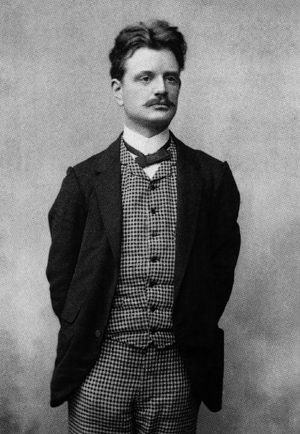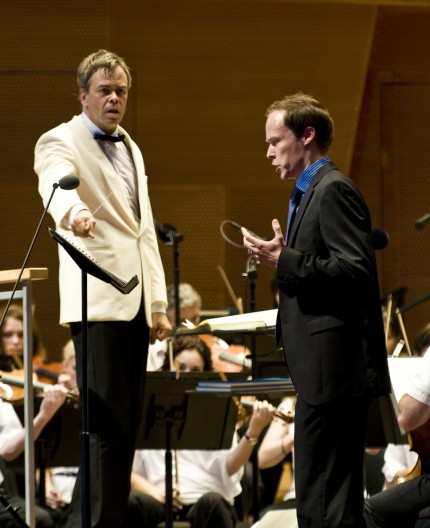Sibelius’s “Kullervo” given a rousing performance by Lintu, Grant Park Orchestra

Sibelius wrote "Kullervo" at age 26, but later withdrew it. The epic work was performed Friday night by conductor Hannu Lintu and the Grant Park Orchestra.
Jean Sibelius is hardly terra incognita to the concert hall with his Finlandia, Violin Concerto and symphonies long-standing repertorial cornerstones.
But rarely does one have the opportunity to experience a performance of Kullervo, the epic work for orchestra, male chorus and vocal soloists that helped to establish Sibelius’s name and launch his career.
Leave it to the ever-adventurous Grant Park Music Festival to deliver the far-too-belated Chicago premiere of Sibelius’s early symphony, performed Friday night by the Grant Park Orchestra under the baton of Hannu Lintu.
Written at age 26, when Sibelius was still struggling to find his own compositional voice, Kullervo enjoyed significant success at its 1892 premiere, yet within a few years Sibelius grew dubious about this journeyman work. He refused to publish Kullervo during his lifetime, effectively withdrawing it from further performances. Shortly after his death, a performance conducted by his son-in-law refocused attention on the “lost” work, yet though it has since been recorded several times, live performances of Kullervo remain a rarity outside of Finland.
Crafted in five movements, Kullervo takes its inspiration from the Kalevala, Finland’s great national epic, which in large part helped to establish the country’s national and cultural identity. Sibelius’s program is an impressionistic take on Kullervo, the only tragic hero in the poetic saga, following the ill-fated man from birth through his battles in war and ultimate death. The longest section is the centerpiece, “Kullervo and his Sister,” depicting the rejected outcast’s violent sexual assault of a woman who he learns, to his horror, is his own sister.
It’s not difficult to see why Sibelius pulled Kullervo from circulation. The Finnish composer had clearly not yet found his own voice, and the shadow of Bruckner hovers nearby along with a bevy of lesser 19th-century Scandinavian composers. In its sprawl, ungainly structure, and ramshackle narrative, Kullervo is the antithesis of Sibelius’s mature works with their taut concision and shearing away of all extraneous matter.
Yet for all its flaws, Kullervo is a fascinating listen for the compelling snapshot it offers of a young, greatly gifted Sibelius on the path to the great composer he would become. The majority of the five movements are purely symphonic. While a great deal of the musical style sounds alien, there are glimpses of mature Sibelius in his distinctive woodwind writing and stark dynamic contrasts, as with the implacable brass chords that alternative with pensive quiet strings at the end of the second movement (“Kullervo’s Youth”).
At 72 minutes, Kullervo is a long Mahlerian haul and scattered audience members bailed before the end Friday night. Yet despite the prolixity and stilted text, there is much inspired music and Kullervo received a powerful, eloquent performance with resplendent playing and singing by the Grant Park forces under Lintu’s incisive direction.
The Finnish conductor seemed to have this national music in his very body, reflected in his demonstrative podium style, yet — showiness apart — Lintu drew commanding and terrific playing from the orchestra. The second movement conveyed the darkly brooding lyrisicm of Kullervo’s unhappy youth and there was ample fire and martial swagger to the penultimate section, “Kullervo Goes to War.” The men of the Grant Park Chorus were magnificent in their handling of Finnish diction — not something they will likely use again soon — with varied vocal expression, robust and tender as required.
In a bit of verisimilitude, the 25-minute centerpiece, “Kullervo and his Sister” was sung by two real-life Finnish siblings. Johanna Rusanen possesses the classic rich, Nordic soprano voice but for all the surface tonal gleam, her singing was expressively bland, conveying little emotional intensity or the sense of the tragic woman’s plight. Ville Rusanen proved more communicative, his plangent, flexible baritone bringing nuanced and expressive vocalism to a not-very-attractive character.
With all the caveats noted above, Sibelius aficionados as well as those interested in Late Romantic repertorial byways really should try to attend Saturday’s repeat performance since Kullervo deserves to be heard and the opportunity may not come this way again.

Conductor Hannu Lintu and baritone Ville Rusanen with the Grant Park Orchestra in Friday night's performance of Rachmaninoff's "Spring." Photo: Norman U. Timonera
Apropos, what are the odds of hearing Rachmaninoff’s cantata Spring in one lifetime, let alone twice in the summer on successive weeks?
It was hard not to compare Friday night’s Grant Park performance, which opened the evening, with that led last week at Ravinia by James Conlon, a belated premiere at both summer festivals.
Call it a draw. At Ravinia, Vasily Ladyuk’s dark stentorian baritone had greater weight and a more powerful idiomatic timbre for this über-Russian work. Yet what Ville Rusanen’s voice lacked in heft, the Finnish baritone made up for in a freer, more expressive singing.
The Grant Park Orchestra played with equal power and commitment to the CSO in Highland Park, with a notably glorious richness Friday to the climactic cello theme. What tilted the performance toward the lakefront festival was the resplendent singing of the full Grant Park Chorus, which simply outclassed Ravinia’s Milwaukee Symphony Chorus across the board.
The program will be repeated 7:30 p.m. Saturday at the Pritzker Pavilion. Admission is free. grantparkmusicfestival.com